My big echeveria afterglow r/succulents
Echeveria spp.. Colorful and ornamental, easy-care Echeveria species, hybrids, and cultivars are flowering succulents that thrive on neglect and arid conditions in the garden.. They can be raised as houseplants as well. Highly valued for their unique, thick leaves, echeveria is widely bred and available in a range of handsome shades, from icy blue-greens to rich reds and purples.

Echeveria tolimanensis Green Form Succulents Australia Sales
Echeveria Atlantis produces big round rosettes with bluish-green leaves. During the summer, the high temperatures cause the leaves to get a powdery blue color but the leaves turn back to normal color. The leaves also have a unique wave/ripple and red tips which bring beautiful contrast to the leaves.. Echeveria Dondo forms gray-green colored.

Echeveria gibbiflora (2" Pot) Little Prince To Go
The Painted Echeveria features beautiful deep green rosettes and stems decorated with vivid red lines. This attention-grabbing plant grows erect rosettes up to 5 inches wide that can stand up to 2 feet tall in clumps up to 3 feet wide. Echeveria nodulosa can stand out in any arrangement just as well as it creates its own complete display. Care
This is currently the largest echeveria imbricata in my garden (39cm/15
Mist the soil, and cover the pot until the new plant sprouts. Place it in a sunny location—but avoid direct sunlight. Once roots have developed (you will see new growth), water sparingly as you would with a mature succulent. After about a month, a tiny rosette will begin to develop at the end of the leaf.

Echeveria Lauii (Very Large with Bloom) Cedar Creek Farmhouse
Echeveria gibbiflora 'Caronculata' is a cultivar of Echeveria gibbiflora with bumpy wart-like lumps, called carunculations, on the upper surface of the leaves. The stem is up to 1 foot (30 cm) long and up to 1 inch (2.5 cm) in diameter. Leaves are gray-green flushed with red and up to 8 inches (20 cm) long.
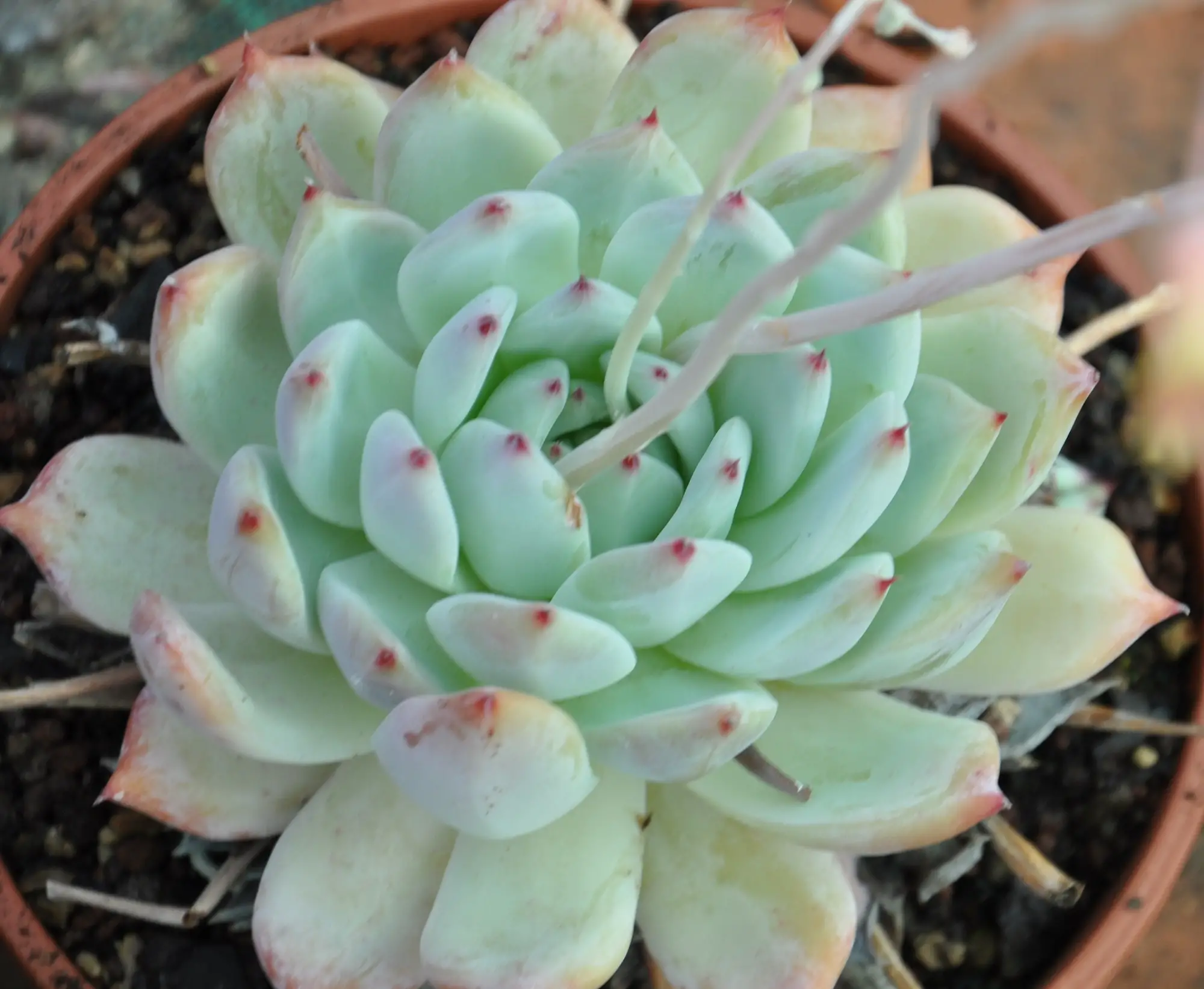
41 Awesome Types of Echeveria (With Pictures) The Green Experiment
This echeveria has a rosette of fleshy white-green leaves with blunt-edged triangles. In a period of around 2-5 years, it can spread up to 1-2 feet. 14. Giant Hens and Chickens. Botanical Name: Echeveria gigantea. Height & Spread: 1-2 feet tall and wide.
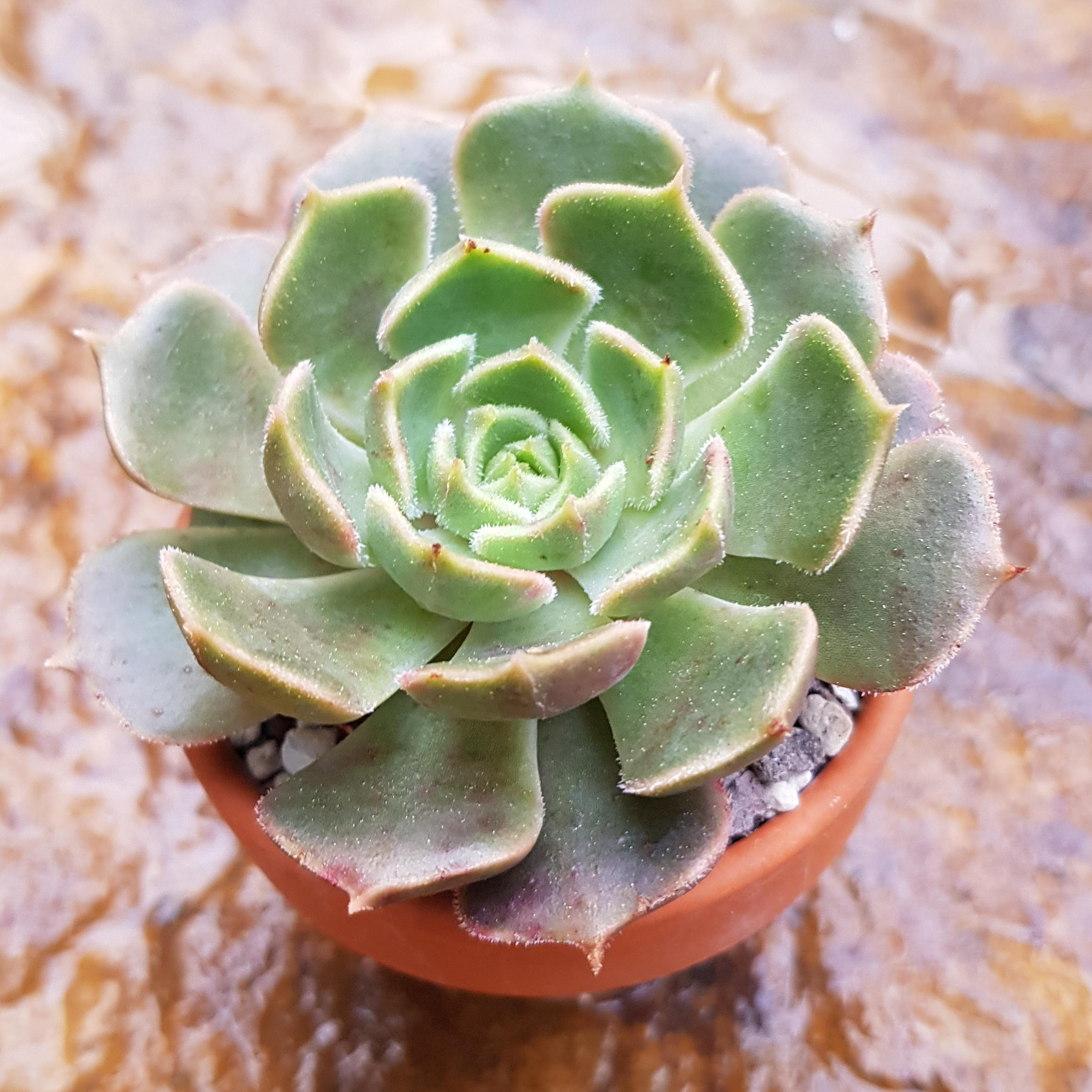
Echeveria secunda green Kakteen Shop
Sometimes called painted echeveria, E. nodulosa is a distinctive species that shows off gray-green leaves edged and variegated in deep maroon red. We also love its flowers—they're pink and yellow. Like many of the other Echeveria we grow, it's showiest in bright light. It grows 14 inches tall and 12 inches wide.
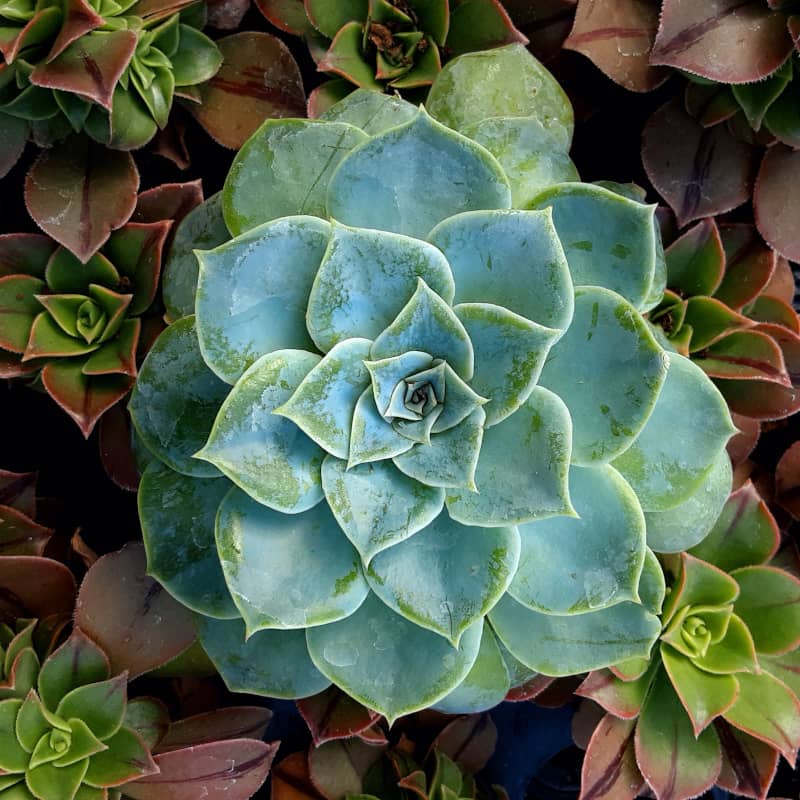
Echeveria Imbricata Green Jardins Zeillinger Botanix
The longer, thicker, and older an echeveria's trunk, the smaller the rosette at the tip will be. Behead an echeveria when the rosette is still large in proportion to the stem. Once it's thick and woody, it's not as likely as a green stem to produce roots or offsets. >> See echeveria beheading in action in this video.

Echeveria Green Pacific or Gigantea AceMegaSucculents
Echeveria Candy Wright- Deeply pink with just the barest green center; Echeveria Uses. Echeverias make excellent houseplants. Use them in a dish garden surrounded by succulents with the same care and light needs. In the garden they may be tucked in around rocks in the rockery, grown in containers, or added to flower beds for dimension and texture.

Cactos Suculentas e Mais Cactos, suculentas e mais Echeveria Big
Painted Echeveria Echeveria nodulosa. Size: 3 to 4 inches tall and 5 inches in diameter; clumps to 1 to 2 feet tall and 2 to 3 feet wide. Color: Pale blue-green and burgundy-red foliage, green flower stems and bracts, coral pink and yellow flowers. Named for its foliage that appears to be painted. Vigorous rosettes produce a profusion of offsets.
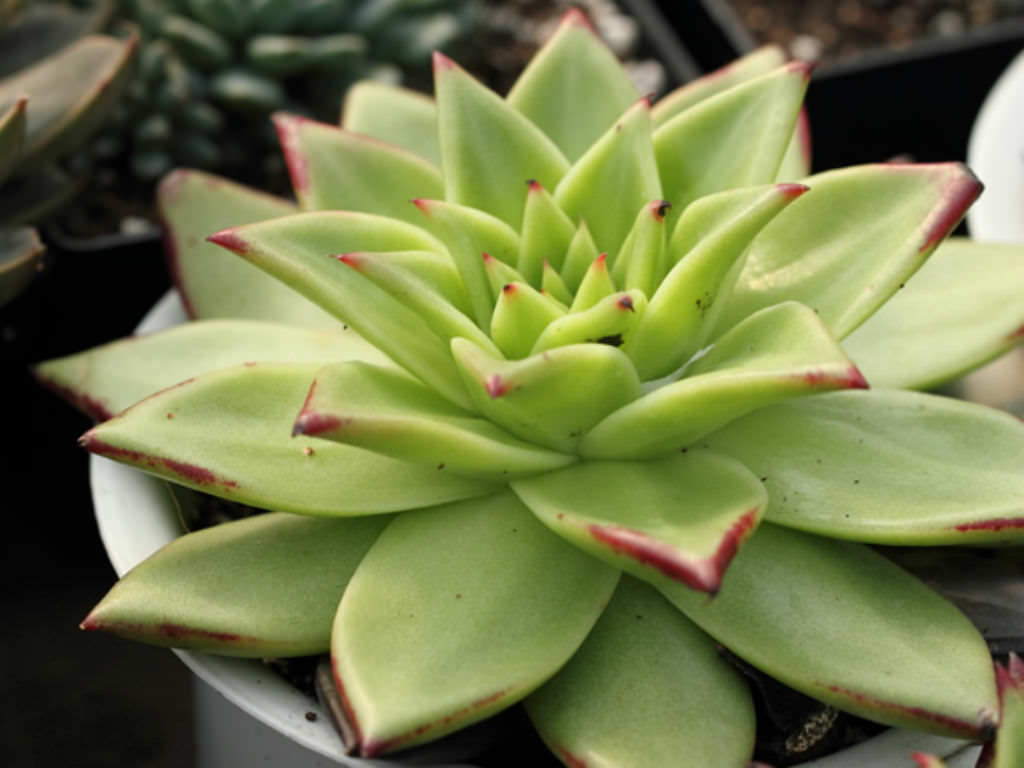
Echeveria agavoides 'Corderoyi' World of Succulents
Echeveria agavoides - pale-green leaves with red tip. In May and June red, lantern-shaped flowers with yellow tips on tall stems. Height 12cm; Echeveria elegans - Large silver leaves that look they are covered in soft down. Yellow tipped pink flowers in summer. Height 50cm; Echeveria 'Blue Frills' - frilled, blue, green foliage with a.

Large Echeveria Succulent Green (15cm diameter, 18cm Long) Corsage
Echeveria affins also commonly referred to as Black Echeveria is a low-growing succulent that forms rosettes of fleshy, brownish-olive leaves. The rosettes grow up to 6 inches tall and about 4 inches in diameter. Leaves are yellowish-green at the base, up to 2 inches long and up to 0.8 inches wide. Flowers are red, star-shaped and sprout on.
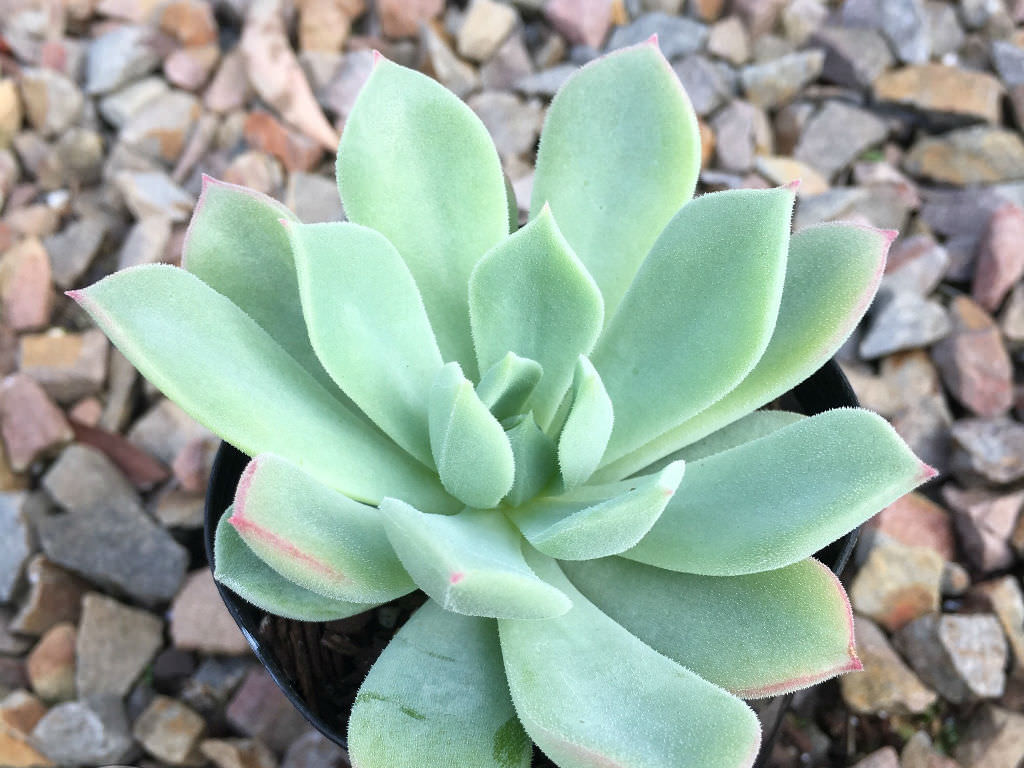
Echeveria 'Haageana' (Green Goddess) World of Succulents
Most Echeveria types exhibit colors ranging from green, green-grey, blue-green, to purple (e.g., Perle von Nurnberg). There are some outliers (e.g., Black Prince), but this mostly holds true. Measure the Size: Barring a few exceptions, most Echeveria types tend to stay between 2-6 inches tall.
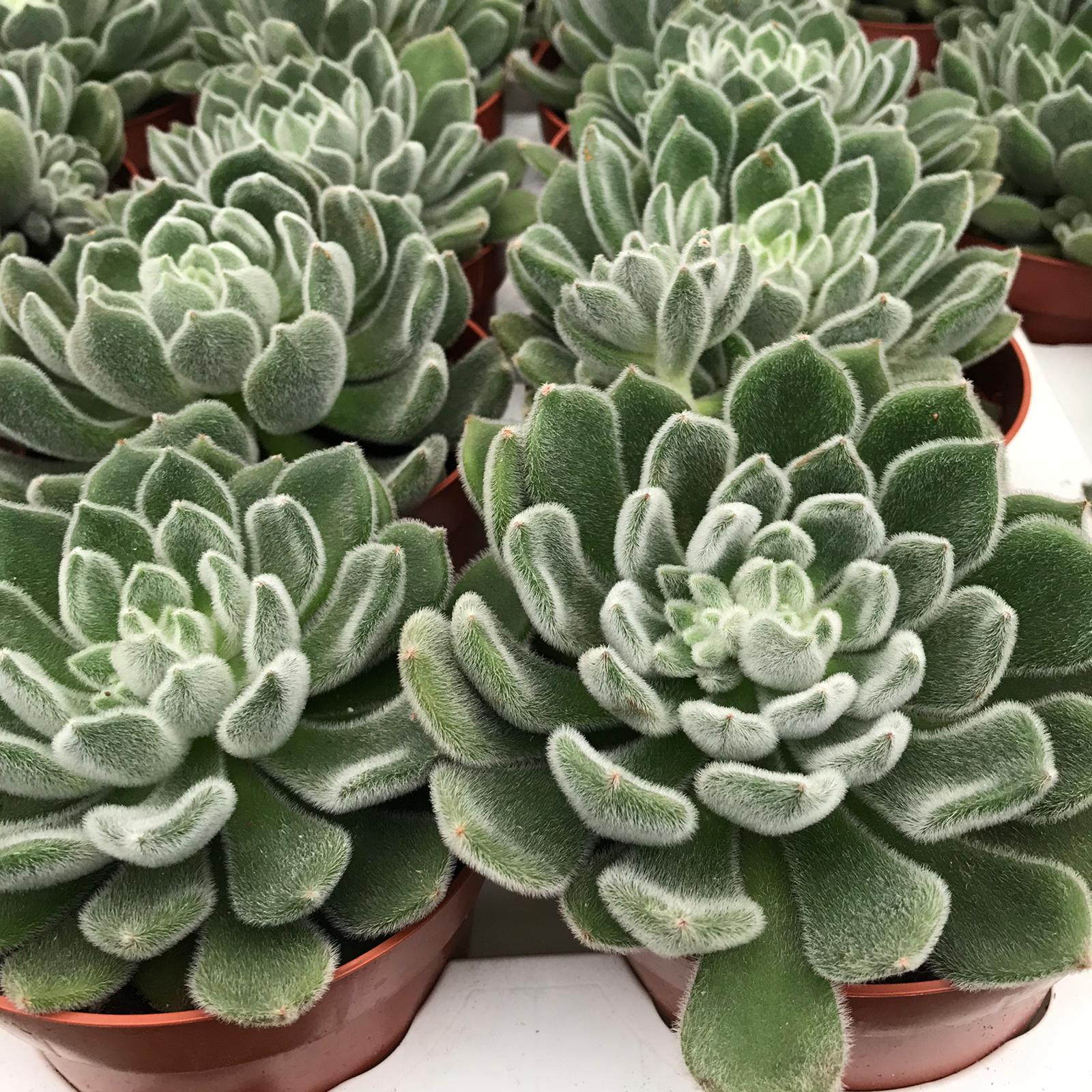
Echeveria setosa (Large) Evolution Reptiles Buy Now
The Best Echeveria Types to Grow. 1. Topsy Turvy Echeveria. Popular for its unique spoon-shaped, blue-green leaves with a touch of silver hue. This fast-growing succulent does well only in a warm climate. 2. Blue Frills Echeveria. The blue-green leaves of this Echeveria have ruffled edges, with symmetrical coral margins.

Echeveria Green Pacific or Gigantea AceMegaSucculents
Echeveria 'Atlantis' is a blue-green succulent with wide leaves that form rosettes. The tips of the leaves turn a lovely pink color if exposed to enough sunlight. 7. Echeveria secunda 'Azulita'. Echeveria secunda 'Azulita' is a type of succulent that has powdery blue leaves and pink tips. This plant offsets freely meaning that it will form clumps of rosettes.

Echeveria tolimanensis Green Form Succulents Australia Sales
shihina / Getty Images. Echeveria nodulosa, commonly known as painted echeveria, is an unusual-looking echeveria distinguished by green leaves with vertical red stripes.This type requires plenty of sun and well-draining soil to thrive. It should be watered only once the soil has dried out completely because too much water can quickly lead to root rot.